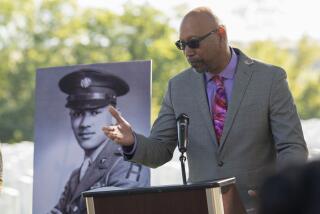Acts of Valor in Long-Ago Battles Aren’t Forgotten
- Share via
Retired U.S. Air Force Lt. Col. Lamar Richard Gillett is a World War II veteran who doesn’t like being singled out, even for hard-won praise.
“I accept this for the valiant American troops still in the Philippines [who] never will be coming home,” said Gillett, 83, who on Saturday was given a belated Bronze Star for fighting in that island nation.
It was fitting that on the eve of the anniversary of the Japanese bombing of Pearl Harbor on Dec. 7, 1941, Gillett would once again stand at attention during a ceremony, albeit in civilian clothes.
He survived the Bataan Death March and 3 1/2 years of Japanese captivity.
Rep. Ed Royce (R-Fullerton) recognized Gillett and Jim Pilkenton, 55, of Los Alamitos, who received a Purple Heart with oak-leaf cluster for wounds received during a North Vietnamese Army offensive while he was serving in the infantry in March 1968. The ceremony was at the Joint Forces Training Base in Los Alamitos.
The groundwork for Gillett’s presentation was laid by his son Ron, a sergeant in the Fullerton Police Department, who discovered on the Internet that veterans who fought in Luzon had become eligible for the Bronze Star.
Pilkenton, the Vietnam War vet who had served as an Army specialist in the 4th Infantry Division, never officially received his medals. He was severely wounded during a mortar attack and said he was more intent on getting out of Vietnam than waiting for an awards ceremony. But as the years rolled by and he became a grandfather, he changed his mind and contacted Royce’s office.
“I wanted to be a good role model for my grandchildren,” he said, speaking of grandson, Phoenix Fryman, 8, and granddaughter, Adagio Borntrager, 3, both of Hemet.
After the ceremony, Phoenix said he was happy and that his grandfather, who he calls “Papa,” made him proud.
Pilkenton received two Purple Hearts and two Bronze Stars for bravery during heavy fighting at a fire base in Vietnam’s central highlands. He was first hit by shrapnel but battle was so intense, helicopters couldn’t evacuate him.
“They patched me up and said, ‘Congratulations, you get a Purple Heart,’ ” Pilkenton said. “Five days later we got hit with a human wave assault, a reinforced regiment of North Vietnamese soldiers.”
Bombarded by mortar and rockets, he answered a radio plea for a volunteer. Grabbing a fire extinguisher, he put out a small blaze and then pulled several soldiers to safety from a burning ammunition bunker. A mortar exploded near him, sending him flying. When he landed, shrapnel had severely cut his legs, two teeth were gone and the back of his flak jacket was sliced four layers deep.
Pilkenton, who was born in Whittier, returned to the U.S., moved to Orange County and worked as an electronic specialist for GTE for 30 years.
Gillett joined the military after leaving his hometown of El Centro when he was 20. He was sent to aviation cadet training in San Diego and became a fighter pilot. Several weeks after graduation, he was sent to the Philippines and was there when the war broke out.
He completed 15 combat missions, totaling 35 hours of combat, and shot down one Japanese fighter plane before being captured on April 9, 1942. A day later, he was forced on the Bataan march with other American and Filipino prisoners.
He also received three Bronze Stars in the Philippines.
After 24 years of military service, he retired in September 1964. He then worked in the outdoor advertising business, retiring in 1994.
His son often drives him to speak to civic groups and schoolchildren. Unfortunately, many schoolchildren haven’t heard of the Bataan Death March, his son said.
“I take him to these talks because the Bataan march is not in most history books,” Ron Gillett said. “Kids today don’t realize that people are still alive like my father who experienced this part of our history.”
“Remember Bataan” became a rallying cry as the nation intensified the task of training an army and manufacturing the arms and equipment needed to win the war.
The nation was shocked by reports of the 60-mile march. About 72,000 U.S. and Filipino troops, many of them wounded, walked up to six days in the tropical sun with little water, food and almost no sleep.
Nobody knows how many prisoners died.
For Pilkenton, sharing the ceremony with Gillett was reward itself. He told Gillett, “I was honored to learn that I was getting my medal with you.”
The two war heroes then embraced.
More to Read
Sign up for Essential California
The most important California stories and recommendations in your inbox every morning.
You may occasionally receive promotional content from the Los Angeles Times.













